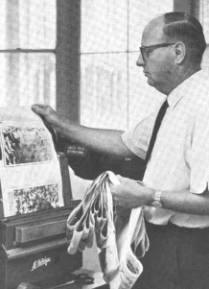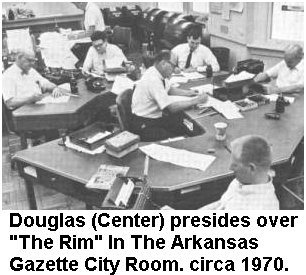 Robert R. Douglas:
Robert R. Douglas:
A Journalist Who Got It Right
By SCOTT MORRIS
White County Historical Society 2000 White County Heritage
Robert R. Douglas
was 20 years old when he received maybe the most important news
of his life: Japan had surrendered. World War II was over.
Douglas, a sailor on the carrier Essex in
the Pacific, was asleep when the word came. “Somebody woke
me up and told me the news,” he recalls. “I went back
to sleep.”
His low-key response belied the relief he
felt. Since joining the Essex in September 1943, Douglas had seen
heavy combat on what was known as “the fightingest ship in
the fleet.” The Essex served in more than 80 operations and
won 13 battle stars, more than any other ship in the Pacific.
In the first serious combat Douglas saw, the six ships of the
task group led by the Essex came under attack from about 130 Japanese
planes. Later, during the battle of Okinawa, the Essex and its
support group were attacked 350 times in three months.
Douglas had known that if the Japanese didn’t
surrender, his ship would be in the thick of an invasion that
was expected to cost 1 million American lives. “I thought
my number was up,” he says. “I had never thought so
before, but I had a sense that the odds were getting real thin.
We’d been so lucky.”
As it turned out, his ship, so long at sea,
was sent home immediately after the surrender was announced. The
Kensett, Arkansas, native who had never seen the ocean before
entering the Navy, was on his way to a long and distinguished
career in journalism, a profession he had picked for himself while
still in the sixth grade.
Standing on the carrier’s flight deck
during that final cruise, Douglas felt a sense of euphoria. “That
was a great time of life,” he says. “Everything was
going to be OK. The future couldn’t have been brighter.”
An avid reader of the Arkansas Gazette –
“It was the usual male progression from the comics to the
sports page to the general news columns” – Douglas had
taken an early interest in public events. He recalls driving with
his parents to the White County courthouse in Searcy to watch
election returns in the 1930s. And, as a young boy, he formed
a friendship with an adult neighbor who would go on to fame and
infamy in state and national politics – Wilbur D. Mills.
After leaving the Navy, Douglas enrolled
at the University of Arkansas, where he served as managing editor
of the Arkansas Traveler before graduating with a degree in journalism
in 1948. While visiting a friend at the Gazette, he was hired
as a general assignment reporter, a job that paid him $40 a week
and began his 33-year association with the oldest newspaper west
of the Mississippi.
During his time at the Gazette, Douglas
also worked as a copy editor, telegraph editor, news editor, and
night managing editor. He was named managing editor Feb. 14, 1972.
Douglas held editorial positions when the paper won two Pulitizer
Prizes, the Freedom House Award, the John Peter Zenger Award,
the Elijah Lovejoy Award – all earned as a result of its
coverage of the 1957 crisis at Central High School. He led one
unsuccessful newsroom strike (in 1949-50) and served as managing
editor when a second attempt to organize newsroom employees failed
(in 1974). Also as managing editor, Douglas formed the Gazette’s
first team of investigative reporters and expanded the paper’s
staff. He presided over the newsroom when Martha Mitchell made
her famous late-night phone calls from Washington and when the
Washington Post called to ask for help investigating an out-of-control
Arkansas politician.
That politician was Congressman Wilbur Mills,
the former White County judge who had taken a young Douglas to
ball games and movies. “It was hard for me,” Douglas
says. “I went the other way and overdid” the paper’s
coverage of Mills’ drunken escapades with a stripper. To
his credit, Mills never asked Douglas to kill the story, but when
it was over he did invite the newspaper editor to his office.
“For an hour and forty minutes I listened to him talk,”
Douglas says. “He said he didn’t remember any of it.
He’d been suffering from a serious back problem, and he said
the doctors who prescribed tranquilizers for his pain hadn’t
told him not to mix them with alcohol. I believed him.”
Douglas left the Gazette in 1981 to become
chairman of the UA journalism department. “The department
was underfunded,” he remembers. “They were doing the
best they could with no equipment. They were teaching one class
in the hall.”
Douglas worked to secure the department’s
full accreditation and to start a master’s degree program
that combined journalism with other disciplines such as history
and political science. One of his more memorable battles rose
out of his efforts to name the department for its founder, Walter
J. Lemke. After the dean’s office had rejected the idea three
times on the grounds that no other UA department was named for
an individual, Douglas asked alumni to write letters to the chancellor
urging the change.
“The chancellor called one day and
said, ‘There’s a move on to name the department for
Walter Lemke. Would you object?’ I said, ‘No, I guess
that’s OK.’”
Douglas, who admits he wasn’t entirely
sure what to do the first time he stepped into a classroom, now
says, “Teaching has been very rewarding. I enjoyed the students
and how receptive they were to learning and what great people
they were. They were interested in the same things I was as a
student: news-papers, newspaper presentation of the news and newspaper
ethics."
Douglas retired from the University in 1991. He is married to
Martha Leslie, the Gazette’s former radio and TV editor.
He writes a weekly column for the Democrat-Gazette and does some
newspaper and legal consulting.
Douglas’ idea of what constitutes good
journalism hasn’t changed over the years: “A newspaper’s
mission is to inform, entertain, and get it right. I don’t
like gimmicks. I like straight journalism. That’s what really
sells newspapers, and that’s what we ought to do.”
 The preceding was written for the program for Bob Douglas
Day, October 29, 1999, in the Department of Journalism at the
University of Arkansas. White County Historical Society president
Eddie Best and his wife Pat were members of the Gazette staff
with Douglas from 1954 until 1965. Pat Best returned to the Gazette
in 1972 and served as Douglas’ administrative assistant until
he left for the U of A in 1981.
The preceding was written for the program for Bob Douglas
Day, October 29, 1999, in the Department of Journalism at the
University of Arkansas. White County Historical Society president
Eddie Best and his wife Pat were members of the Gazette staff
with Douglas from 1954 until 1965. Pat Best returned to the Gazette
in 1972 and served as Douglas’ administrative assistant until
he left for the U of A in 1981.
 The preceding was written for the program for Bob Douglas
Day, October 29, 1999, in the Department of Journalism at the
University of Arkansas. White County Historical Society president
Eddie Best and his wife Pat were members of the Gazette staff
with Douglas from 1954 until 1965. Pat Best returned to the Gazette
in 1972 and served as Douglas’ administrative assistant until
he left for the U of A in 1981.
The preceding was written for the program for Bob Douglas
Day, October 29, 1999, in the Department of Journalism at the
University of Arkansas. White County Historical Society president
Eddie Best and his wife Pat were members of the Gazette staff
with Douglas from 1954 until 1965. Pat Best returned to the Gazette
in 1972 and served as Douglas’ administrative assistant until
he left for the U of A in 1981.